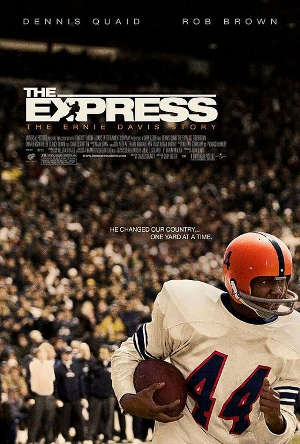- Title: The Express
- IMDB: link

 Sports movies are often filled with cliché and usually fall into one of two categories – the underdog who makes good (Rocky, Seabiscuit, Major League, Hoosiers, Miracle, Blue Crush) or the team facing racial diversity (Remember the Titans, Pride, Glory Road). Although The Express falls into the later category it has enough of its own voice to separate it as something more than just another Titans knock-off. It’s not a great film, but it’s better than I expected.
Sports movies are often filled with cliché and usually fall into one of two categories – the underdog who makes good (Rocky, Seabiscuit, Major League, Hoosiers, Miracle, Blue Crush) or the team facing racial diversity (Remember the Titans, Pride, Glory Road). Although The Express falls into the later category it has enough of its own voice to separate it as something more than just another Titans knock-off. It’s not a great film, but it’s better than I expected.
The film follows the college career of young Ernie Davis (Rob Brown) who follows in the footsteps of his hero Jim Brown (Darrin Dewitt Henson) to play football for Syracuse University.
After the early scenes involving Ernie’s recruitment by Brown and head coach Ben Schwartzwalder (Dennis Quaid), the film moves to Syracuse, the short scenes involving Davis’ freshman season on the bench, and his break-out sophomore year.
In terms of sports movies many of the regular clichés are on hand here. Quaid is the gruff coach with a heart who learns to love and trust his players, and the film showcases the racial issues of the time in a mostly family friendly PG kinda way. However the film also strays from the pat formula in some interesting ways.
Davis isn’t the headcase, the star with the ego, the brain, or the fool. He’s just a good guy with a talent for playing football and a drive to prove something to himself, as well as his detractors, on the field. Rob Brown gives a strong performance that will either make or break the movie, and he succeeds.
I also like the urging of Ernie’s brother (Nelsan Ellis) who chastises him into understanding how important his role is off the field as well as on and to think not only about football. Although I was expecting the racism on the field and in the towns the team traveled (as in Remember the Titans and other films), here was something with a new slant which added to the palette of the film and made Davis a more contemplative and complete character.
Most of the film deals with Davis and his sophomore season leading Syracuse to the National Championship. The later scenes involving the season for which he won the Heisman and his ill-fated pro career are only vaguely touched on in comparison.
The football scenes are well shot and the film has a nice pacing in terms of how the film and Davis’ career at Syracuse are cut together. I would have liked a little more after that sophomore year, but understand the need of the sports movie genre to give us the big climax before moving quickly through later events. I do wonder, however, if those months after his diagnosis which are only glimpsed at here might have made for a more stirring and compelling film.
The life of Ernie Davis, like so many sports figures is both a sad and glorious one. Director Gary Fleder and screenwriter Charles Leavitt do justice to adapting Robert Gallagher‘s biography and sharing with us the college career which won Davis the Heisman, and the story of the man under the helmet who was the first African-American athlete to achieve the honor.
